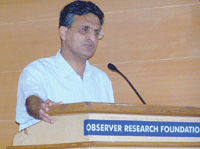Ajit Jha interviewed Dr. Deepak Pental, vice-chancellor of Delhi University, in the Viceregal Lodge of the North Campus. Excerpts:
 Delhi University has slipped from 254th in the THE-QS world university rankings 2007 to 274 in THE-QS league table 2008. What’s your reaction?
Delhi University has slipped from 254th in the THE-QS world university rankings 2007 to 274 in THE-QS league table 2008. What’s your reaction?
I think there were several upheavals in the ranking this year. There were modifications in the ranking criteria as a result of which technical institutes were given more weightage. We have two engineering colleges but their research profile is very low.
Isn’t it an indictment of India’s tertiary education system that China which is perceived as relatively backward, has four universities listed among the top 200? How do you explain the poor image of Indian higher education?
China is not backward compared to us. Their democratic structures are weak, otherwise their growth rates are much higher. They have invested hugely in their universities. The per capita expenditure on tertiary education in India is far less compared to China. We need to invest proportionately much more than we are doing now to improve the performance of Indian higher education.
A recent NASSCOM-McKinsey study indicates that 75 percent of India’s engineering graduates and 85 percent of the country’s arts, commerce and science graduates are unemployable. What’s your comment?
I am not surprised. We are not teaching skills. There has been a phenomenal growth of education shops in India, but there is a severe shortage of skills desired by industry. Two-three years ago we were producing on average 800 Ph Ds every year in engineering and barely 50 Ph Ds in computer sciences. We cannot attain world class status in research and teaching with this low output. Language and maths skills are the two basic skills that must be taught well to make an impact in the jobs market. These skills are needed for employment and a large number of our graduates lack them.
Most vice-chancellors of other universities are of the opinion that DU's premier position among India’s varsities is attributable to the much larger government grants you receive. What’s your comment?
We don’t believe we are a premier varsity by global standards. We have to go a long way. Our funding levels have been very low for many years. Funding has improved only during the past two years due to OBC quota expansion. The vice-chancellors of other universities should focus on their issues rather than saying DU has got more money. The state universities are starved of funds. They should band together and demand more.
What initiatives, if any, have you taken to ensure that du gets a higher ranking in the THE-QS world universities rankings 2009?
We have taken a number of initiatives and introduced a number of courses such as M. Tech in nuclear physics and technology, nano materials and nano technology, chemical synthesis, and several frontier areas. Other initiatives include introduction of the semester system, introduction of several inter-disciplinary courses, several new undergraduate courses. Recently, we have set up an Institute of Life Long Learning. Moreover recently our affiliated colleges have received grants for upgrading main libraries, laboratories and computa-tional facilities. Another 80 computers are in the offing to be given to each college.
How optimistic are you about the global competitive capability of India’s higher education institutions in the near future?
We need to take several bold steps before our higher education institu-tions can become globally compe-titive. First, we need to strengthen our science and engineering educa-tion on a high priority basis. Second, there must be reform of the regulatory bodies and greater investment in education. Third, we need to improve our competitive grant systems for research and development.